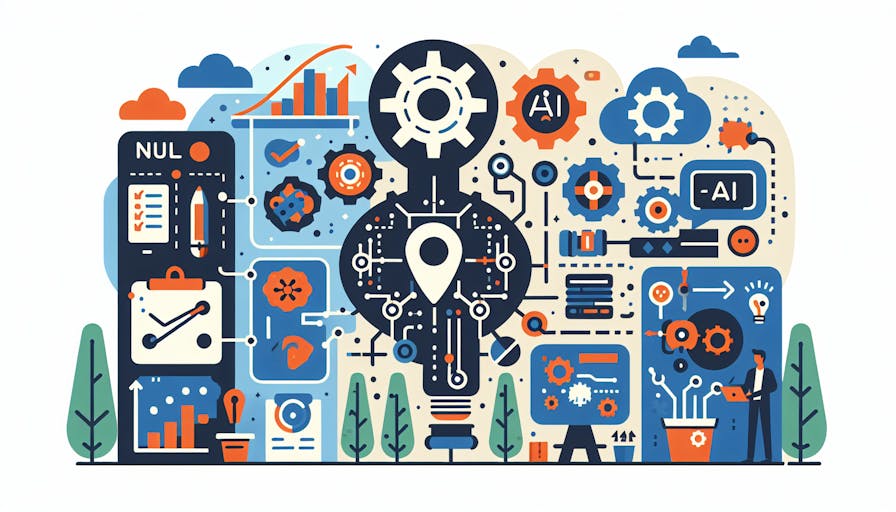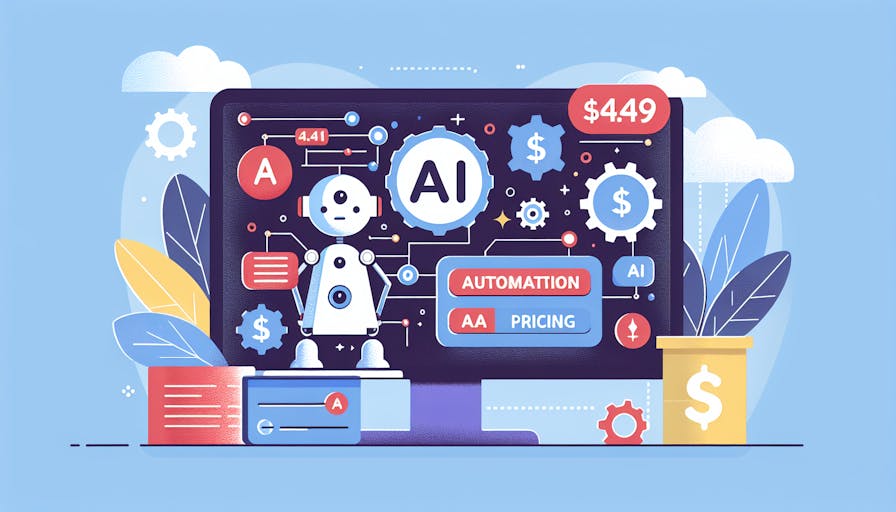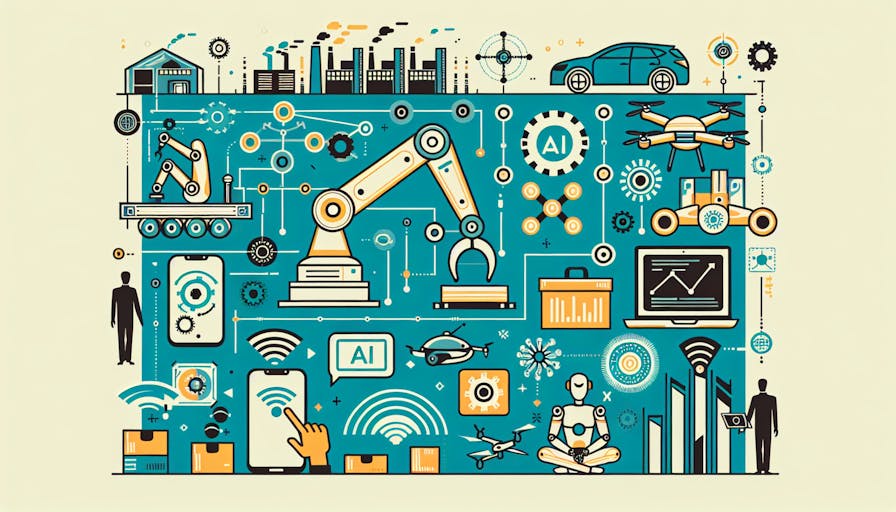It won’t be a bigger problem to find one video game lover in your neighbor. Since the introduction of Virtual Game.
Understanding AI Agents
What is an AI Agent?
An AI agent is a computer program designed to perform specific tasks autonomously by processing data and making decisions. I define AI agents as systems that use artificial intelligence to simulate human-like interactions and functionalities. They can analyze inputs, learn from experiences, and adapt their behavior over time.
AI agents can range from simple rule-based programs to complex machine learning models, enabling them to handle various applications across different industries. For example, they can be designed to assist with customer inquiries, recommend products, or analyze data patterns.
Role of AI Agents in Automation
AI agents play a significant role in automation across various sectors. Their capabilities enable businesses to increase efficiency and streamline processes. I often see AI agents being employed in tasks like customer support, data analysis, and even creative processes.
Here are some key roles that AI agents fulfill in automation:
| Role | Description |
|---|---|
| Task Automation | Automating repetitive tasks to free up human resources. |
| Decision Making | Analyzing data to make informed decisions quickly. |
| Interaction Handling | Managing customer interactions through chatbots or virtual assistants. |
| Data Collection | Gathering insights from large data sets to support decision-making. |
By integrating AI agents, organizations can optimize their workflows, reduce human error, and enhance overall productivity. To learn more about the advantages provided by AI agents, visit our article on benefits of ai automation. For insights on pricing and value, check ai automation agency pricing.
Through understanding how AI agents function and their importance in the automation landscape, I appreciate the transformative impact they can have on businesses today. For further exploration of current trends in this space, see our piece on ai automation trends.
AI Agent Examples
In exploring AI agents, I can identify several categories that illustrate their functionality and application. Below, I provide examples that showcase how AI agents are used in various domains.
Chatbots
Chatbots are one of the most common examples of AI agents. They interact with users in a conversational manner, providing instant responses to queries. Many businesses utilize chatbots for customer service, allowing for 24/7 support without human intervention.
| Feature | Description |
|---|---|
| Availability | 24/7 customer support |
| Response Time | Instantaneous replies |
| Common Uses | FAQs, appointment scheduling, order tracking |
Chatbots enhance user experience and streamline communication. For more information on the advantages of AI in service automation, you may want to check out the article on ai automation agency services.
Virtual Assistants
Virtual assistants, like those found on smartphones and smart devices, are another example of AI agents. These agents use natural language processing to understand and respond to user commands. They can perform tasks such as setting reminders, playing music, and providing weather updates.
| Feature | Description |
|---|---|
| Interaction | Voice-based and text-based commands |
| Integration | Connects with various applications and devices |
| Common Uses | Scheduling, navigation, smart home control |
Virtual assistants significantly improve productivity and task management. Their continuous updates enhance their capabilities over time, providing a more personalized experience.
Recommendation Systems
Recommendation systems use AI agents to analyze user data and suggest relevant products, services, or content. Commonly seen in platforms like streaming services and e-commerce sites, these systems enhance the user experience by delivering tailored suggestions based on individual preferences.
| Feature | Description |
|---|---|
| Data Analysis | Uses algorithms to analyze user behavior |
| Personalization | Provides recommendations tailored to user interests |
| Common Uses | Shopping suggestions, movie recommendations |
These systems leverage user interactions to refine their algorithms, ultimately increasing user satisfaction and engagement. For insights into the overall advantages of implementing AI, visit the article on benefits of ai automation.
These examples illustrate how AI agents function across various settings, enhancing efficiency and user interaction in distinct ways. Understanding these applications is essential for grasping the broader concepts related to AI automation and its implementation process.
Implementation of AI Agents
The implementation of AI agents is crucial for developing effective automation solutions. This involves the training and development of AI agents, followed by their integration and deployment into existing systems.
Training and Development
Training an AI agent involves using large datasets to help it learn how to perform specific tasks. During this process, I focus on selecting relevant data sources and ensuring that the data is clean and representative of the target use case. Depending on the complexity of the tasks, different training methods may be applied.
Here’s an overview of the key steps in the training process:
| Step | Description |
|---|---|
| Data Collection | Gathering relevant data that reflects various scenarios the agent might encounter. |
| Data Preprocessing | Cleaning and formatting the data to ensure quality and consistency. |
| Model Selection | Choosing an appropriate machine learning model based on the task requirements. |
| Training | Applying the selected model to the prepared dataset to enable the AI to learn. |
| Testing | Evaluating the agent’s performance against a separate test dataset to ensure accuracy. |
Integration and Deployment
Once the AI agent has been trained effectively, the next step is integration and deployment. This involves embedding the agent into existing workflows, systems, or applications where it can interact with users or other systems.
Key considerations during integration include:
| Consideration | Description |
|---|---|
| Compatibility | Ensuring the AI agent works seamlessly with existing technological infrastructure. |
| User Interface | Developing an intuitive interface for users to interact with the agent efficiently. |
| Scaling | Preparing the system to handle increased demand as the AI agent is used by more users. |
| Monitoring and Maintenance | Setting up systems to monitor the agent's performance and making necessary adjustments post-deployment. |
Through understanding the AI automation implementation process, I can ensure that AI agents are deployed effectively, thereby maximizing their potential to enhance productivity and efficiency. Implementing AI agents not only streamlines tasks but also opens the door to new opportunities. For further insights, consider exploring articles on the benefits of AI automation or current AI automation trends.
Benefits of AI Agents
AI agents offer numerous advantages in various fields, significantly enhancing processes and outcomes. In this section, I will discuss three key benefits: efficiency and productivity, enhanced customer experience, and valuable data insights.
Efficiency and Productivity
One of the primary benefits of AI agents is the ability to improve efficiency and productivity. These agents can automate repetitive tasks, allowing human workers to focus on more complex and strategic activities. This shift not only saves time but also enhances output.
For example, AI agents can handle tasks such as data entry, scheduling, and customer inquiries, which traditionally consume a significant amount of time. This increases overall productivity within organizations.
| Task Type | Time Saved per Task (hours) | Additional Tasks Completed |
|---|---|---|
| Data Entry | 2 | +3 |
| Customer Service | 1 | +4 |
| Scheduling | 0.5 | +5 |
Enhanced Customer Experience
AI agents play a crucial role in enhancing customer experience. Through chatbots and virtual assistants, businesses can provide instant responses to customer inquiries, ensuring that assistance is available 24/7. This immediacy helps meet customer needs effectively.
Moreover, AI agents can analyze customer interactions to personalize services, leading to higher satisfaction rates. They can also gather feedback and provide insights into customer preferences, which can inform business strategies.
| Customer Interaction | Satisfaction Rated (1-5) | Response Time (minutes) |
|---|---|---|
| AI Chatbot | 4.5 | 1 |
| Human Agent | 4.1 | 5 |
Data Insights
AI agents are invaluable for gathering and analyzing data. They can process vast amounts of information quickly, identifying patterns and trends that would be difficult for humans to recognize. This ability to derive insights helps organizations make informed decisions.
For instance, AI agents can track customer behavior, monitor market trends, and evaluate operational efficiency. These insights allow businesses to adapt their strategies, optimize resource allocation, and improve service offerings.
| Insight Type | Frequency of Updates | Value to Business |
|---|---|---|
| Customer Behavior Analysis | Real-time | High |
| Market Trends | Weekly | Medium |
| Operational Efficiency | Monthly | High |
The benefits of AI agents extend across various dimensions, contributing to increased productivity, better customer experiences, and meaningful data insights. Interested individuals can explore further in articles on benefits of ai automation and ai automation trends.
Challenges in AI Agent Implementation
Implementing AI agents comes with its own set of challenges that must be considered for successful deployment. I will explore three primary issues: data privacy and security, ethical considerations, and technical limitations.
Data Privacy and Security
AI agents often require access to vast amounts of personal and sensitive data to function effectively. This leads to significant concerns regarding data privacy and security. I understand that ensuring compliance with data protection regulations, such as GDPR, is crucial for building trust with users.
In my experience, organizations must implement robust data protection measures to safeguard user information. This can include encryption, access controls, and regular audits of data handling practices. Below is a table summarizing common data privacy concerns in AI automation:
| Data Privacy Concern | Description |
|---|---|
| Unauthorized Access | Potential for breaches if proper security measures are not in place. |
| Data Retention | Need for policies on how long personal data is stored. |
| Third-Party Sharing | Risks associated with sharing data with external vendors. |
Ethical Considerations
Another challenge in the implementation of AI agents is ethical considerations. I recognize the importance of developing AI systems that align with societal values and norms. Issues such as bias in algorithms, transparency in decision-making, and accountability for AI actions are crucial.
By addressing these ethical considerations, I can help promote fairness and inclusiveness in AI systems. Below is a table highlighting key ethical concerns in AI automation:
| Ethical Concern | Implication |
|---|---|
| Algorithmic Bias | Potential for discrimination if training data is unbalanced. |
| Transparency | Users may not understand how decisions are made by AI. |
| Accountability | Questions arise about who is responsible for AI-driven decisions. |
Technical Limitations
Finally, technical limitations can impede the effectiveness of AI agents. Despite advancements in AI technology, challenges such as connectivity issues, hardware limitations, and the need for specialized skills can affect the smooth implementation of AI systems.
I have found that organizations need to invest in the right infrastructure and training to overcome these technical barriers. Below is a table that outlines some common technical challenges in AI automation:
| Technical Challenge | Description |
|---|---|
| Connectivity Issues | Poor internet connections can limit AI functionality. |
| Hardware Requirements | Some AI models need high-performance computing resources. |
| Skill Gaps | Organizations may lack personnel with specialized AI expertise. |
Addressing these challenges is essential for ensuring a successful AI automation implementation process. By prioritizing data privacy, ethical considerations, and technical readiness, I can contribute to more effective and responsible AI solutions. For additional insights on this topic, you can check our articles on ai automation agency services and benefits of ai automation.



